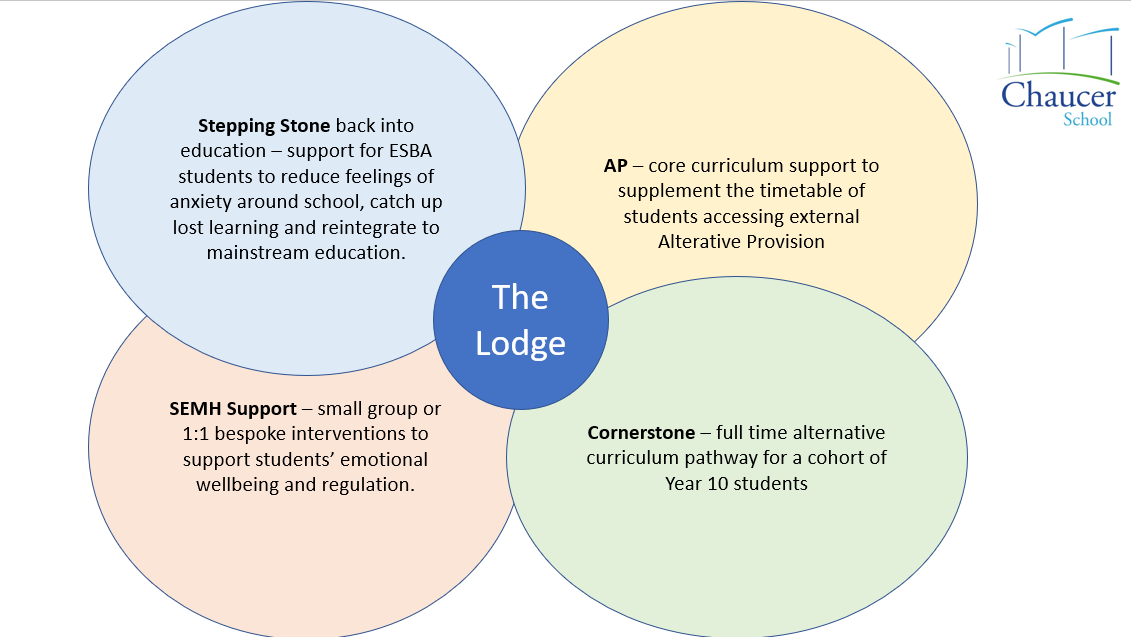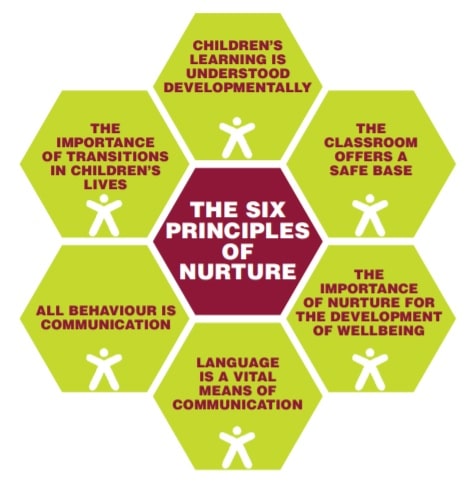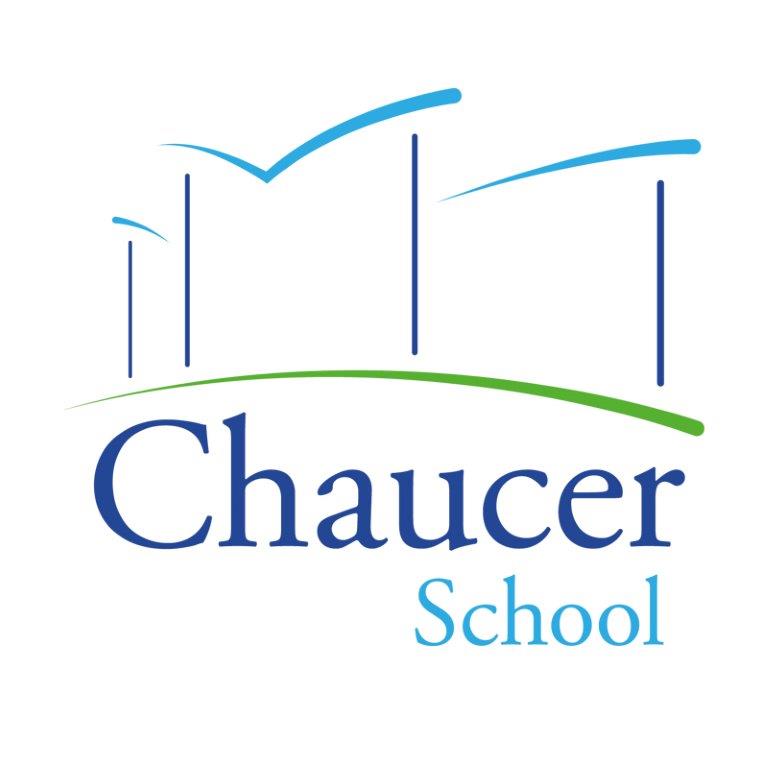The Lodge
The Lodge (previously called LINCs) offers alternative curriculum support for individuals and groups of students who may be experiencing challenge or barriers to learning and engagement. The provision supports students with a combination of a taught academic curriculum alongside support and intervention focusing on emotional regulation and wellbeing, executive functioning skills and support for academic success as part of their whole education provision.
Your child may be referred to The Lodge if staff feel that they need some extra support with their learning, behaviour, wellbeing or attendance. The Lodge offer will be reviewed half-termly and the aim is to reintegrate to a full-time main school timetable with support over time.
The Lodge building is on the school site to the right-hand side of the car park, between Asda and Chaucer School main building. The building consists of two classrooms, an intervention space, a sensory room, a calm room, a recreation room (used for Arts & Crafts and at social times), a computer suite, two offices and a kitchen.

Support or interventions offered through The Lodge
From September 2024, a full-time Year 10 provision called Cornerstone will be running from The Lodge building. This will run alongside the Stepping Stone Back into Education provision for students struggling with attendance. We will continue to offer interventions such as student support mentoring and sessions for students with Social, Emotional or Mental Health difficulties. All interventions are timetabled and visible on Bromcom. Please contact The Lodge staff if you have questions about your child's bespoke intervention and offer of support.
Examples of support or interventions offered through The Lodge:
- Social time support
- Catch up/keep up for core subjects
- Stepping stone back into education – Attendance provision
- Functional Skills English AQA Qualification
- AQA Unit Award Scheme
- Social skills
- My community and me
- Nurture support
- National Literacy Trust programmes – Represent and Empower. Communication and oracy skills to re-engage learners
- Drama/team building
- Life skills
- Therapeutic art
- Zones of regulation
- PSHE/SRE
- 1:1/small group mentoring with an experienced support practitioner
- Referrals for support from external agencies such as Unravel
- Support with emotional well-being
- Boxall Profile assessments and learning plan
- SRE
- Anxiety/wellbeing
- Managing ADHD symptoms
- Emotional literacy
- Coping with change
- Resilience
- Self-esteem
- Working memory/focus/listening and concentration skills
A lot of the work that happens in nurture groups is underpinned by a psychological theory known as attachment theory. This theory states that children learn age-appropriate behaviour through interaction with trusted adults.
Nurture group activities can include:
Building bonds: Building trusting and mutually respectful bonds is all about trusting others and being responsive to an individual child’s needs.
Cognitive Restructuring: This is about recognising things that may trigger emotional outbursts from children and helping them to deal with these feelings and spot the difference between helpful and unhelpful thoughts and feelings.
Modelling: When children see role models demonstrating appropriate behaviour and social skills they are more likely to participate in these skills themselves.
Goal Setting: When children start attending a nurture group staff may talk to them about what they would like to get out of the group, as then progress can be tracked.
Emotional Literacy: Emotional literacy is about being able to understand, identify and label the emotions that we feel. Children with strong emotional literacy skills will also become fluent at recognising the environmental and physical cues of different emotions. To help develop these skills, children will need opportunities to practise verbalising their emotional experiences.
Emotional regulation Techniques: Nurture groups can help children to learn different techniques that they can use to calm during high pressure or emotionally charged situations.

The Lodge Curriculum
|
SEMH/ESBA |
Learning objective |
|
Resilience Emotional regulation Therapeutic Art
|
Learning about emotional regulation Emotional literacy Coping strategies for managing stress Positive engagement in learning Speaking and listening Zones of regulation: Blue Zone: low level of arousal; not ready to learn; feels sad, sick, tired, bored, moving slowly. Green Zone: calm state of alertness; optimal level to learn; feels happy, calm, feeling okay, focused. Yellow Zone: heightened state of alertness; elevated emotions; has some control; feels frustrated, worried, silly/wiggly, excited, loss of some control. Red Zone: heightened state of alertness and intense emotions; not an optimal level for learning; out of control; feels mad/angry, terrified, yelling/hitting, elated, out of control.
|
|
Managing Anxiety |
Learn what stress is and how to manage it Coping strategies for managing stress Understanding emotions How does anxiety affect the body and brain? Strategies to manage anxiety Talking about worries and concerns. Look at thought stopping and worry time and practice these techniques at home and in school. Awareness of thought patterns – thought, feeling, behaviour cycle Adapting to stressful times in life How relationships are affected by difficult times |
|
AQA Unit Award Scheme
|
Gaining certification for demonstrating key reading, oracy and writing skills Core subject catch up CV/planning for Post-16 Positive engagement in learning Recognising feelings and emotions Art project Emotional Awareness and understanding mental health Creative writing Transactional writing Reading different texts Reading comprehension |
|
Personal Social Development |
Community Action – why do we need rules, reasons behind criminal behaviour, preventing crime, personal responsibility, role of the police, organised crime, fairness and justice, youth crime, safe and unsafe places Identity and culture Environmental awareness Food safety in the home and community Healthy Eating Healthy Living Individual rights and responsibilities Leisure Time Managing money Parenting awareness Preparation for work Managing social relationships |
|
Learn Sheffield SRE/LIFE |
Gaining independence Healthy relationships Transition – starting secondary school Making new friends Dealing with change Study skills, resilience and managing stress Basics of mental health Managing mental health/self-harm Self-worth Thinking about the future Staying healthy Introduction to relationships Conflict and resolution Past, present and future Stress bucket Feeling blobs Healthy family relationships/friendships Romantic relationships Intimacy Relationships online Unhealthy relationships, boundaries and consent Contraception Rights Online wellbeing Parenting Values Unsafe relationships Gender stereotypes What kind of person do I want to be Ending or improving relationships Consent Identities Peer pressure, exploitation Knife crime Discrimination and prejudice Norms, values and behaviour What is a community? Bullying Body image Body awareness Anti-racism Grief Personal safety Healthy choices – eating, sleep, hygiene, drugs, alcohol, online safety Managing stress Mental health linked with difficult times |
|
Literacy
|
Key reading and writing skills Accuracy and precision SPAG Working as a group Learning about emotional regulation and emotional literacy Building self esteem Reciprocal reading Reading short stories and creative writing |
|
Functional Skills AQA Step Up to English Functional Skills Entry Level Qualification |
The course will enable students to develop skills in reading, writing and spoken language. Students will engage with creative, as well as real and relevant, texts to develop critical thinking skills. They will be encouraged to read fluently, write effectively and demonstrate a confident control of spoken English. |
|
Core subject catch up – alternative curriculum – ESBA or AP |
Maths – sequences, angles, percentages, fractions, triangles, area, perimeter, decimals, averages, shapes English – short stories by Edgar Allen Poe, Roald Dahl Creative writing – responding to an image stimulus, a setting, using symbolism, narrative writing, descriptive writing, developing character KS4 – English Language Paper 1 and Paper 2 Planning for Post-16 Life and Art lessons Speaking and listening Reciprocal reading Non-fiction writing challenges Reading and comprehension Writing to inform, describe or persuade |
|
National Literacy Trust Represent Programme |
Oracy and expressing your opinion Reading and understanding extracts Learning about: Body image/social media Activism/social justice Relationships Resilience Gender/identity Influence |
|
National Literacy Trust Empower Programme - Digital Literacy |
10 session programme to give students to make empowered choices on the internet |
Welcome to The Lodge video
Cornerstone
Cornerstone Curriculum Overview 2024-2025
|
English Language |
Students are working towards GCSE AQA English Language |
|
English Literature |
Students are working towards GCSE AQA English Literature |
|
Maths |
Students are working towards GCSE Maths |
|
Science |
Students are working towards Entry Level Certificate in Science covering topics such as the human body and the periodic table. |
|
AQA Unit Award |
Students are awarded certificates for demonstrating a range of skills such as oracy, critical literacy and self-reflection. Students complete project-based work on a range of topics such as identity and self, Art and Cultural Capital. |
|
Functional Skills |
Students practice key Literacy skills such as spelling, comprehension, written accuracy, debate/spoken language and fiction and non-fiction reading and writing. Working towards Pearson Functional Skills assessment objectives |
|
LIFE |
Students follow the mainstream LIFE curriculum as well as bespoke sessions focusing on preparation for adulthood. Students cover topics such as bullying, transition, healthy relationships, emotional literacy, wellbeing, risk, crime and planning for post-16 education and the world of work. |
|
Nurture |
Students complete a range of nurture style activities both individually and as a group, encouraging self-reflection and co-operation. Examples of activities include emotion blobs, memories jar, island of hope, drama team building games and social stories. |
|
Prince’s Trust |
The Prince’s Trust programme is a 12 week course in confidence and employability focusing on readiness for work. |
|
Forest School |
Outdoor education focusing on teamwork skills. Activities include: fire building, campfire cooking, building shelters and learning how to tie knots. |
|
Thinking Reading |
Students complete the NGRT screening test and students who require intervention complete Thinking Reading sessions 1:1 with Holly Palmer. |
|
1:1/small group mentoring |
With Brooke Mitchell – bespoke mentoring working towards Boxall targets |
Please contact awhitfield@chaucer.sheffield.sch.uk (Teacher and The Lodge Leader) if you have any questions about this provision at Chaucer School
